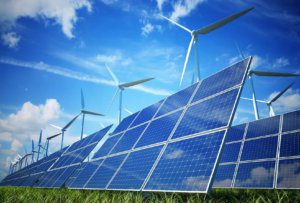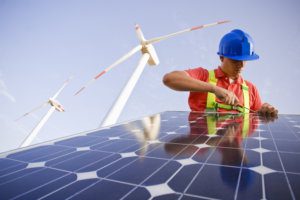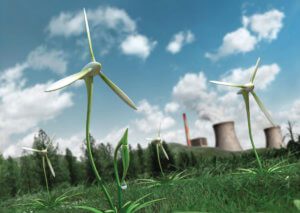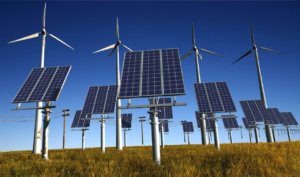
National Energy Company Ukrenergo has urged Ukraine’s Energy and Coal Industry Ministry to announce a tender to build new highly maneuverable generating facilities to balance operation of renewable energy facilities, the company has said on its website. Ukrenergo recalled that in case of further rapid growth of green generation and an increase in its share, problems with its balancing may arise. “According to the results of the analysis, we modeled several scenarios for the development of events, provided that measures were not taken to properly balance green energy. In particular, the main negative consequences will be the restriction of renewable energy sources with the compensation of the feed-in tariff for unproduced electricity or the increase in the volume of coal generation and the restriction of nuclear power, given the need to increase opportunities for balancing. Both scenarios will be a significant obstacle to overcoming dependence on fossil fuels and improving the environment in the country,” the company said.
The company also said that any restrictions on the connection of renewable energy facilities and the provision of technical conditions are prohibited by the Transmission System Code, provided that the customer complies with the requirements of the Code.
“The development of renewable energy in Ukraine is an indicator of the country’s attractiveness to the international community. In this regard, the company expects to continue constructive cooperation with state security agencies in responding to potential threats to the Ukrainian energy system and supporting the initiative to build new highly maneuverable capacities,” Ukrenergo said.
Earlier, the Security Service of Ukraine, in a letter to the Prime Minister, expressed concerns about the destabilization of the country’s energy system due to the “excessive” issuance of technical conditions for the connection of renewable energy facilities.

The European Bank for Reconstruction and Development (EBRD) is about to invest from $2 million to $4 million in the development of infrastructure of auctions stimulating renewable energy, EBRD Deputy Director in Ukraine Marina Petrov said during her interview to the Reform.Energy website. “This is the money that we are already asking for now from the donors in order to launch a high-quality auction,” she said. She explained that market players might not be able to perceive poorly organized auctions. “This is very important to keep up the balance of interests in order to receive the most outstanding result,” Petrov said. The auctions will have to be transparent, understandable and in line with legislation.
According to her, the EBRD during Ukraine’s transition to the auctions stimulating renewable energy is ready to share its experience from similar auctions in those countries which were the first ones to introduce such tools. Such or similar auctions are held in Turkey, Poland, Bulgaria, Jordan, Egypt, and Armenia, she said.
The amount is to be allocated within the EBRD’s USELF-III lending facility approved in July this year in the amount of EUR 250 million to support private renewable energy projects in Ukraine, she said.
Speaking at the Ukrainian Financial Forum organized by the ICU Invest Group in Odesa, the EBRD representative said that market operators had questions as for who would be a balancing player on this market. She said that the EBRD was working jointly with the U.S. Agency for International Development to create the market of balancing facilities and invest the funds in more mobile parts of the system, e.g. batteries, gas turbines. “This is next year’s agenda,” Petrov said.
In general, she described the situation on the renewables market as a “quick sprint” – the investment is to be made while the current feed-in tariffs are in effect.
“We’ve got many investors who are mulling over investment this and next year. We have fewer investors who are preparing projects for 2020-2021. We see there will be a steep decline,” she said.
In this connection, she called on the adoption of a law on renewable energy auctions by the end of the current year.
Ukraine has great potential for the development of other sectors of renewable energy, mainly biofuel and small hydro facilities, she said.
DEVELOPMENT, EUROPEAN BANK, INVEST, RECONSTRUCTION, RENEWABLE ENERGY

Ukraine and Norway are negotiating about investments in renewable energy projects for EUR300-400 million, Ukrainian Foreign Minister Pavlo Klimkin has said. “We are starting work with a number of Norwegian companies that come to build relations in renewable energy. The matter concerns serious investment of EUR 300-400 million,” the minister said at a joint press conference with the Norwegian foreign minister in Kyiv.
According to Klimkin, the matter concerns projects, in particular, related to solar energy.

The European Bank for Reconstruction and Development (EBRD) has approved a new program USELF III (Ukraine Sustainable Energy Lending Facility) worth EUR 250 million to support private projects in renewable energy in Ukraine. EBRD Senior Adviser for External Relations Anton Usov told Interfax-Ukraine the board of directors made the corresponding decision at a meeting on July 18. The bank said it has been supporting the development of renewable energy in Ukraine within the framework of the USELF program since 2009, but it expires on June 30, 2018, and USELF III should replace it.
During the first program, the bank financed projects for total of more than EUR 100 million to fund projects with a total capacity of over 150 MW of various renewable energy technologies, the document says. The EBRD notes that as a result of the development of the renewable energy sector, interest from large international developers is growing, and they are ready to implement larger projects in the field of renewable energy.
The bank also says that despite the significant growth of the sector in Ukraine, its share remains insignificant at 1.5%, while the National Action Plan for Renewable Energy envisages the increase of this share to 11% by 2020.